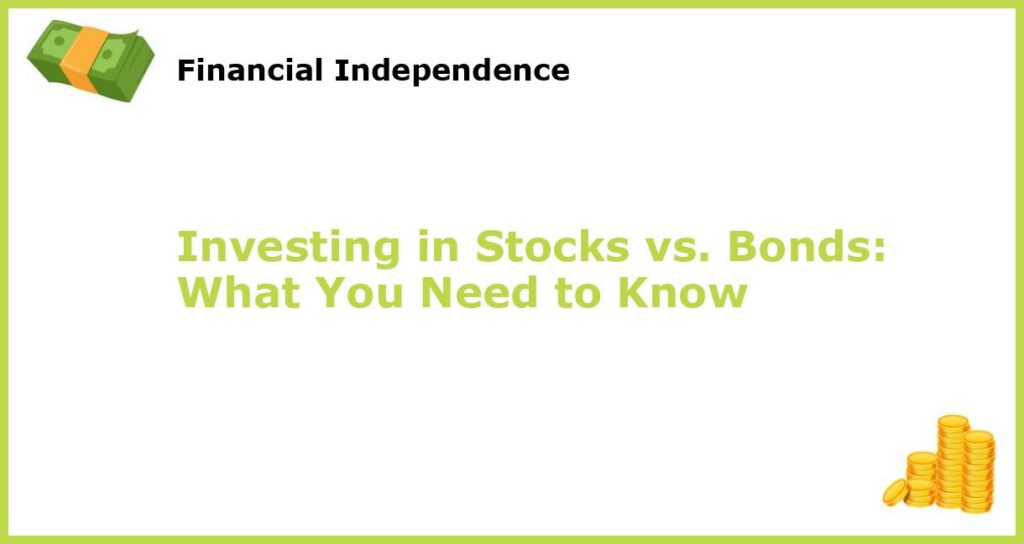Investing your money can be a great way to grow your wealth over time. However, it’s important to understand the different types of investment options available to you, and the risks and rewards associated with each. When it comes to investing in the market, there are two main options to consider: stocks and bonds. In this article, we’ll take a closer look at each of these types of investments, and what you need to know before diving in.
Understanding Stocks

Let’s start with stocks. When you buy a stock, you essentially become a partial owner of that company. The value of your stock can fluctuate based on a number of factors, including the company’s financial health, industry trends, and overall market conditions. When a company does well, its stock price tends to rise, and when it does poorly, the stock price tends to fall.
Investing in individual stocks can be risky, especially if you’re not familiar with the company or its industry. However, you can also invest in mutual funds or exchange-traded funds (ETFs) that track a basket of stocks, which can help diversify your investment and potentially reduce your risk.
In terms of potential rewards, stocks have historically outperformed other types of investments over the long term. On average, the stock market has returned around 10% per year over the past century, though that figure can vary widely from year to year.
Understanding Bonds

Now let’s move on to bonds. When you buy a bond, you’re essentially lending money to a company or government entity. In return for your contribution, you receive regular interest payments and the promise of getting your initial investment back at a later date.
Bonds are generally considered less risky investments than stocks. Since they’re a form of debt, they’re more stable and less subject to market volatility. However, they also tend to offer lower potential returns over the long term.
Just as with stocks, you can invest in mutual funds or ETFs that track a basket of bonds, which can help diversify your investment and potentially reduce your risk.
Risk and Reward

As we touched on already, stocks are generally considered riskier investments than bonds. However, they also have the potential to offer higher rewards. The stock market can experience significant volatility, which means your investment’s value can skyrocket one day and plummet the next.
If you’re thinking about investing in stocks, it’s important to do your research and invest in companies that you believe have strong growth potential. This can help increase your chances of seeing a positive return on your investment.
On the other hand, if you’re looking for a more stable investment option, bonds may be a better choice. Just keep in mind that they may not offer the same potential for high returns as stocks over the long term.
Tax Implications

Taxes can have a significant impact on both stocks and bonds. In general, any income you earn from either type of investment is subject to taxes. However, the way taxes are calculated can vary depending on the type of investment, which can impact your bottom line.
For example, capital gains taxes apply to profits you make from selling stocks. The amount of tax you pay can vary depending on how long you’ve held the investment, with long-term investments typically being subject to lower tax rates. Meanwhile, interest earned from bonds is generally taxed at your ordinary income tax rate.
Diversification

Diversification is key when it comes to investing. By spreading your investments across a variety of stocks and bonds, you can limit your exposure to risk and potentially improve your overall returns.
Instead of investing all your money in one or two individual stocks, for example, it may be better to invest in a number of different stocks across different sectors and industries. The same applies to bonds – investing in both government and corporate bonds can help spread your risk and improve your chances of achieving long-term growth.
Investment Horizon

The amount of time you’re willing to hold onto your investments can play a significant role in the type of investment you choose. While stocks tend to be more volatile in the short term, they have the potential to offer higher rewards over the long term.
If you’re investing money that you won’t need in the near future, such as money for retirement, stocks may be a good option. Investing in a diversified portfolio of stocks can help reduce your risk and potentially increase your returns over time.
Market Timing

Trying to time the market – or predict when the market will go up or down – can be a risky proposition. Even the most experienced investors often struggle to accurately predict the market’s movements.
Rather than trying to time the market, it’s generally better to focus on long-term investing strategies. This means investing in a diversified portfolio of stocks and bonds, and holding onto those investments for a period of years or even decades.
Investment Fees

When it comes to investing, fees can add up quickly. Make sure you fully understand the costs associated with a given investment before committing your money to it. Things like management fees and trading commissions can eat into your returns over time.
One way to reduce your investment fees is to invest in low-cost index funds or ETFs. These types of investments are designed to track specific indexes or sectors, and tend to have lower fees than actively managed funds.
Expert Advice

Investing can be a complicated process, and there’s a lot to consider. It can be helpful to consult with a financial advisor or other investment professional before making any major decisions about your money.
A good financial advisor can help you understand your investment options, develop a long-term strategy, and make informed decisions about your money. Just be sure to choose someone who’s reputable and has experience working with clients in a similar financial situation to yours.







